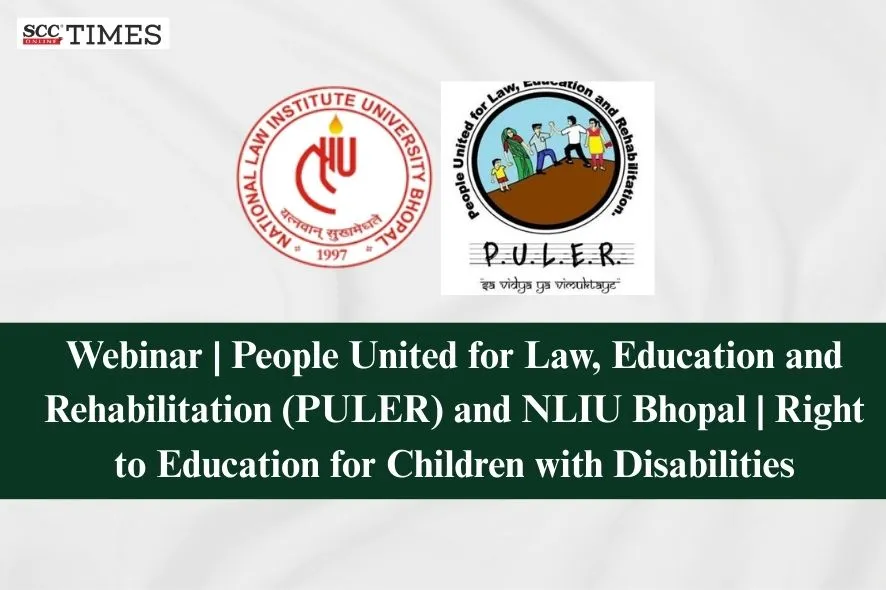Introduction
A recent webinar organized by the People United for Law, Education and Rehabilitation (PULER) at the National Law Institute University (NLIU) on 3rd August brought together an engaging discussion on how legal frameworks, social attitudes, and the real-life experiences of persons with disabilities intersect. The session was led by Ms. Anchal Bhatheja, an inspiring lawyer with vision impairments and a distinguished alumna of NLSIU, Bangalore. Drawing from her own journey and expertise, she offered a perspective that went beyond a purely legal reading, steering the conversation toward a more inclusive, rights-based understanding of equity and accessibility.
Personal Narratives and Shifting Perspectives
The webinar began with Ms. Bhatheja inviting attendees to reflect on their own formative years and initial encounters with disability. Their responses revealed a range of emotions. One student recalled feeling ‘quite scared because of the stigma’ before realizing that ‘they are just normal children.’ Another described their first encounter as “a bit peculiar for the fact that I was really scared of, okay, what is wrong with that kid.” A third participant shared a moving story about seeing ‘specially abled children’ begging on the street, leading to a powerful realization: we are the same age, but we are the one among the fortunate ones.
According to Ms. Bhatheja, these personal accounts mirrored broader societal themes of fear, benevolence, charity, stigma. She then meticulously dismantled the historical concepts of disability that have shaped these attitudes and, in turn, legal frameworks. She traced how societal views on disability have evolved over time beginning with the old religious paradigm that treated disability as a form of divine punishment, then moving to the charity paradigm, which cast it as something to be pitied and alleviated through compassion. This was later replaced by the medical paradigm, which reduced disability to a defect in the body that needed to be “fixed.” In contrast, she highlighted how modern law has broken away from these narrow approaches, instead recognizing disability as an inherent and universal part of human diversity something as natural and enduring as the “sun and moon.”
The Shift to a Rights-Based Framework
The webinar’s legal analysis focused on major legislative changes in India that have moved the discussion from a deficit-based to a rights-based approach.
-
The Persons with Disabilities (Equal Opportunities, Protection of Rights and Full Participation) Act, 1995: This act was a direct response to the United Nations’ “Decade of Persons with Disabilities” statement. It was a historic move that introduced a 3% reservation for people with disabilities in public employment and used a “functional test” rather than a strictly medical one.
-
The Rights of Persons with Disabilities (RPWD) Act, 2016: This legislation represents a significant paradigm shift. It defines disability as a result of social barriers that prevent a person from equally participating in society. This definition places the responsibility for creating an inclusive environment on society rather than the individual. The Act also expanded the list of recognized disabilities to 21 categories. Ms. Bhatheja also highlighted the precedent set in the Gulshan Kumar v. Institute of Banking Personnel Selection case, which established that even people with less than 40% disability are entitled to reasonable accommodation.
The Two Pillars of Inclusion: Accessibility and Reasonable Accommodation
A significant portion of her presentation focused on two core principles that lie at the heart of inclusive practice:
-
Accessibility: This refers to the legal minimum requirements for an inclusive environment, including physical accessibility standards (e.g., wheelchair-accessible door widths), digital accessibility for websites, and functional accessibility, which ensures all aspects of life, such as college festivals and sports teams, are inclusive.
-
Reasonable Accommodation: This is a dynamic, customized, and consultative procedure. Ms. Bhatheja cited the landmark ruling in Vikas Kumar v. UPSC, where Justice D.Y. Chandrachud of the Supreme Court ruled that the right to reasonable accommodation is a fundamental part of the right to life guaranteed by Article 21. This right applies to anyone who needs special assistance to enable equal participation and is not dependent on a specific benchmark disability.
Practical Challenges and Systemic Change
The webinar’s Q&A section offered important insights into the practical difficulties of putting the law into practice. The enforcement and implementation gaps were a key issue, as the penalty for non-compliance with the RPWD Act (a fine of just ₹10,000) is often insufficient.
Ms. Bhatheja emphasized the need for a more strategic approach to awareness. She suggested educating parents and teachers about the tangible benefits of obtaining a disability certificate, including access to pensions and reservations. She also stressed the importance of integrating disability sensitization into the training of future professionals such as doctors, teachers, social workers so that inclusivity becomes a natural part of their practice rather than an afterthought.
Conclusion
The webinar provided a rich, multi-dimensional exploration of disability rights in India, weaving together both legal and social perspectives. While the RPWD Act, 2016, offers a strong foundation, the discussion made clear that its promise can only be realized through effective implementation, institutional reform, and, most importantly, a shift in societal attitudes. The session served as a powerful reminder that true inclusion is possible only when laws, courts, educational institutions, and society at large work in concert toward that goal.







